Who is Harmony Woods? Getting to know the most exciting new artist in Philly DIY
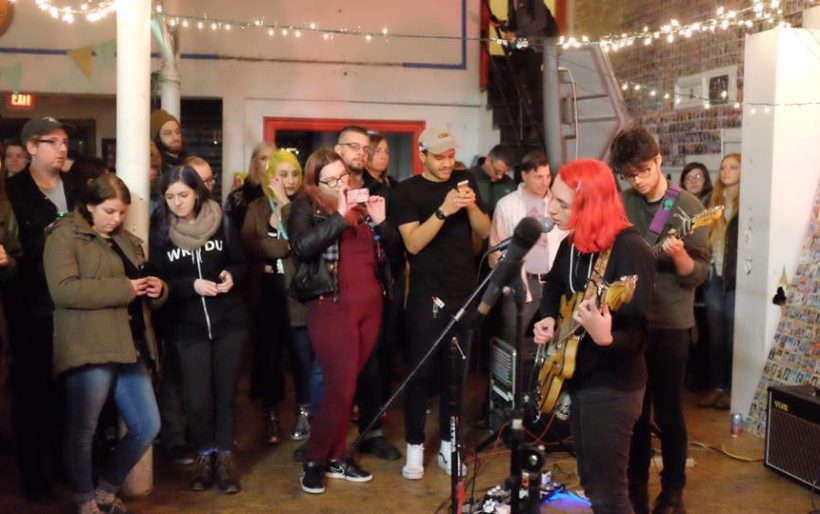
Harmony Woods | photo by John Vettese for WXPN
If you ask Sofia Verbilla, she’ll tell you she’s no good at onstage banter.
It gives her a not super comfortable feeling, a sentiment shared by just about any honest musician you’ll talk to. Her nerves are already frazzled enough getting up there with her guitar and performing; add in expectations for public speaking that’s witty, chill and conversational but also profesh enough to keep the show moving and remind you that, oh by the way, there’s merch in the back…it’s just daunting. Awkward. Verbilla is not the sort to toss around the word “hate,” so let’s just say the closest form of active dislike you can get.
I would argue that the frontwoman of Philadelphia basement scene favorites Harmony Woods is fantastic at banter, and here’s an illustration. It’s March, her band is playing Underground Arts for an International Women’s Day benefit; a tuning break is needed, and the slight silence that descended during the last song lingers. (Verbilla has that effect on crowds.) As bartenders dump ice buckets in the wings, she asks, “So, does anybody have any jokes?” A pause. “I know one. THE PATRIARCHY.” She blows a raspberry into the mic and gives a thumbs-down; the audience gathered round the stage laughs, and the band launches into another song.
Really, everything about it was perfect. The right thing to say for this crowd, at this event. (Or, let’s face it, in general.) The timing was spot-on. It was funny. And it got the gig from point A to point B. When it comes to banter, as with most things music-related, Verbilla is a natural.
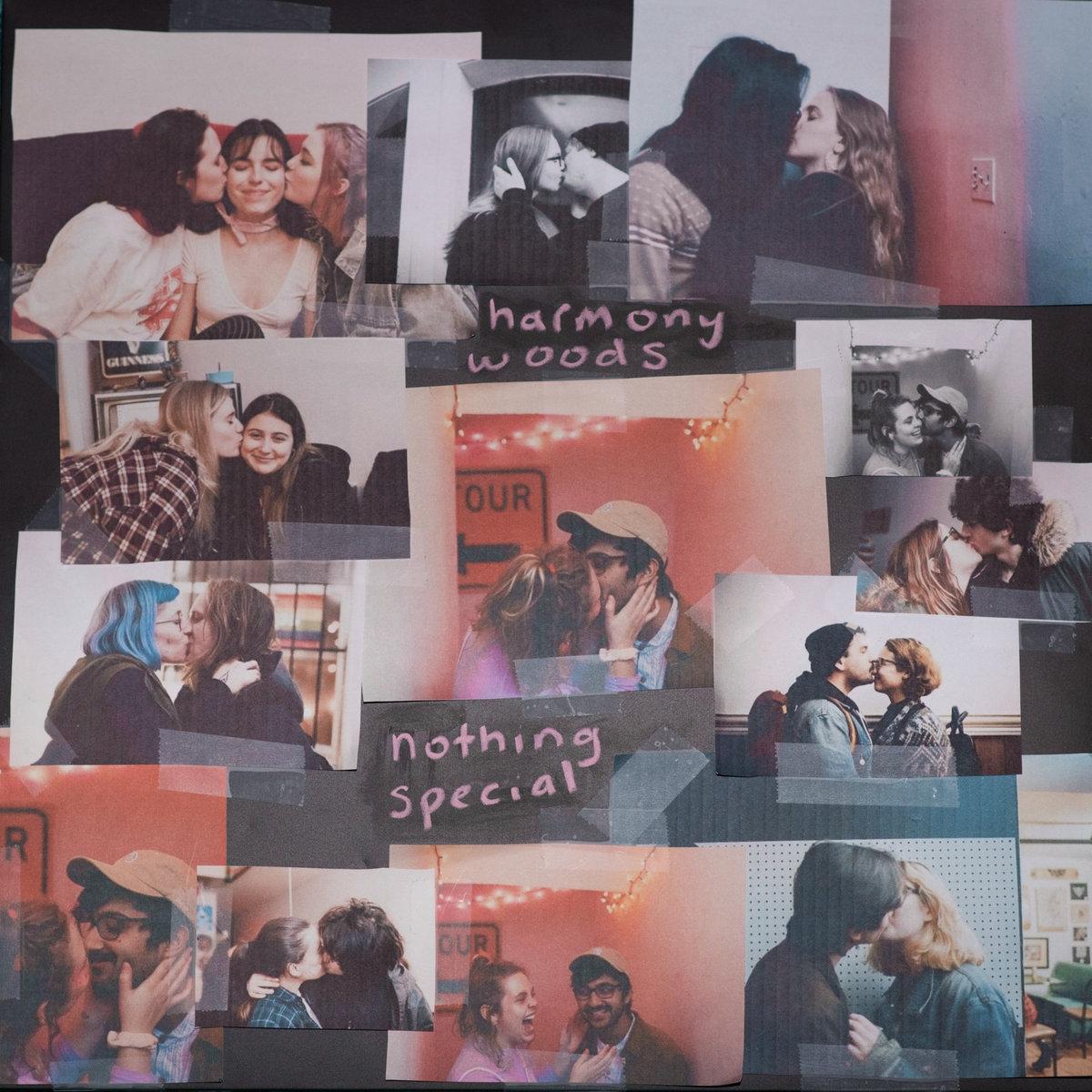
Harmony Woods’ Nothing Special | cover art by Emily Dubin
The debut record from Harmony Woods is called Nothing Special, and it’s been out for just over a week on the Massachusetts indie label Honest Face Records. The album is rich in instrumental tones and melodies — folksy acoustic guitar and racing emo riffs alike provide a backing to Verbilla’s commanding alto vocals. It’s also rich in thematic content — she is a gifted storyteller and scene-setter, and her observational lyrics detail the nerve-wracking noise of regional rail, the litter of red solo cups at crowded scene parties, the self-consciousness of first meetings and the solace of empty parking lots, all driving the record’s central narrative; a cycle of songs about the breakdown of a relationship, not from the common angle of heartache and scorn, but rather from the bigger-picture view of mental health, self care and reconciliation.
It’s a confident set of songs, even as it embraces a lack of confidence. In the song “Best Things,” she sings “I guess it’s a good thing that I’m a pessimist / because the best things never happen when you expect them to.” It’s a conundrum, but a kinda hopeful one.
“It’s just how I go about life, I guess,” says Verbilla. “I am a pessimist, I don’t expect much from anything. And through that, I find myself to be pleasantly surprised a lot of the time.”
Verbilla, 18, hails from Abington, just across the Philadelphia / Montgomery County border, and has been playing guitar for almost eight years. She’s studied trumpet and piano in that time as well, and claims she’s not great at either of the latter…but she was decent enough to make All City Band in eighth grade, so who knows.
Beyond playing in orchestra at Abington High School (which she’ll graduate from in a couple weeks), Verbilla has done the rock camp thing at a few spots around the area: a program from Settlement Music School in Jenkintown, and at the School of Rock in Fort Washington. That experience taught her how to play alongside other musicians, to be conscious of your own part in a piece of music as well as hearing the scope of the whole. But she finds it immensely more rewarding when she gets in front of crowds with her own songs.
“It makes me feel really good inside when I play music that I wrote with other people, in front of other people,” Verbilla says. “It’s really cool, it’s a lot cooler than playing songs that other people wrote with a bunch of kids who…you might not like that much.”
She doesn’t say if that last thing is an issue specific to orchestra or to rock camp; she does admit she found the latter to be super cliquey the first time she attended. “I used to be really shy when I was younger, and everyone there already knew each other. They already had friends, already had their friend groups and I was just this nerdy kid who liked emo revival and that’s all I wanted to talk about.” She pauses and smiles. “I guess not much has changed.”
Our interview pauses, and there’s a laugh to the side; a voice adds “One thing has changed. You found people to talk about it with.”
That’s Sofia’s father, Keith Verbilla, and he’s a big part of her story as well.
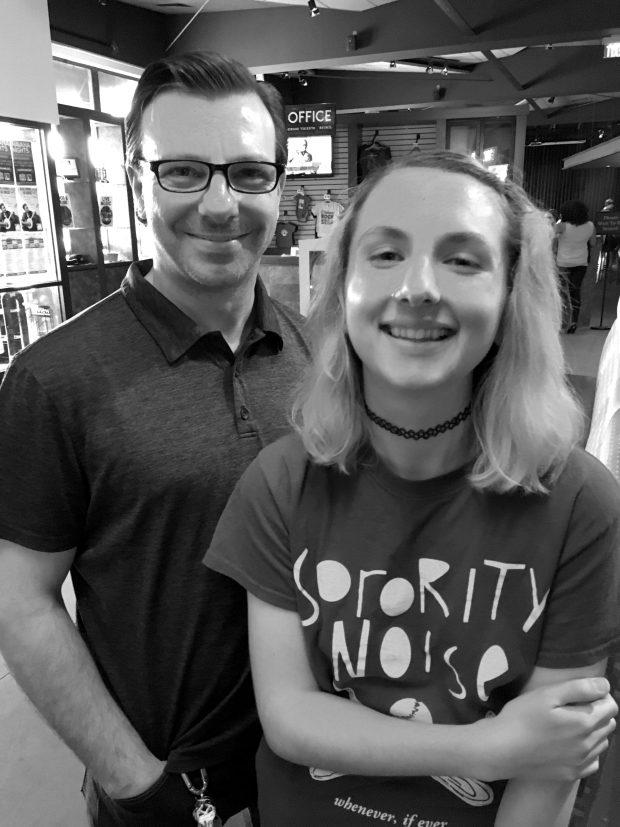
Keith and Sofia Verbilla | photo by John Vettese for WXPN
It’s exceedingly rare to see a Harmony Woods gig where Keith, 48, isn’t in the crowd. This is certainly for practical reasons; he’s Sofia’s ride to and from shows. But you won’t find him bored in the back or waiting out in the car, counting off the minutes till it’s over; nor is he an overbearing stage parent, up front and micromanaging. Keith is the ideal combination of laissez faire and fully engaged: clearly proud of his daughter, supportive and loving, but also allowing her space to do her own thing. Also, let’s pause and appreciate the awesome rarity of a basement show dad; Chrissakes, I couldn’t even get my parents to come to The Troc with me as a teenager. Much respect.
“You know you never know when you’re gonna see the next thing!” he says excitedly when asked about being at shows not just as a chaperone but also a fan. “Any night, there’s gonna be five bands, and they could be five horrible bands. But one night you could see the band that’s gonna be your new favorite. Like when I saw Tool at Dobbs, or Queens of the Stone Age when it was called the Pontiac.”
Keith loves music; he’s taken Sofia’s older sister Caitlin to gigs by heavier-leaning bands like Nine Inch Nails. The three collectively saw Modest Mouse at Steel Stacks a few years back, before Sofia was writing songs. He played bass in his 20s, never got serious with it to the point of playing in his own band or anything, but wound up working as a road tech for touring metal acts like Monster Magnet and Overkill.
As Keith tells it: “I just lived the rock and roll life style all through the 90s. Like really lived it – for two years my mail went to J.C. Dobb’s. It was just a lot of fun. When Sofia’s mother and I settled down, she was born and I kind of lost touch with it. And then we split, and I went a little crazy. I met my current wife and sobered up; I’ve been sober for a little over eleven years. And eventually found my way back to Fi.”
When she first asked him to take her to a gig by her favorite band, Modern Baseball, Keith recalls being uncertain. But he went along, watched the show, and found it refreshing. “They’re decent people. They’re not out for the party, like it used to be.” It’s an observation he makes of underground music in general, which he says has become very much more socially aware. “The consciousness of the scene is changing. It’s less about who’s got the best band and more about let’s make music, let’s support each other.”
And Keith is an integral part of that support; he was there every step of the way of the record, from recording to mixing and mastering. But he’s hands off (to this observer anyway) and refrains from excessive meddling. “I have my moments!” he laughs. “But it’s always based off of my experience, advice and tips.” Keith tells me about watching Harmony Woods practice the song “Renovations,” and stressing to them the importance of returning to full band energy after the tempo change on the bridge. “’You’ve gotta be 100% to get that impact.’” Sofia laughs to hear this, and he continues. “I mean, that’s exactly how I explained it. Just, you know, little coaching things.”
“But it’s stuff I know!” she responds slyly.
Keith shrugs, and says “If she played softball, I’d probably be doing the same thing.”

Harmony Woods | photo by Jess Flynn | jflynnphoto.com
Last spring, Sofia created a Bandcamp page for the project she decided to call Harmony Woods. She posted three demos, recorded on an iPhone in her bedroom at home. (“Lo fi by circumstance,” as the tagline goes.) Among them was “Ghosts,” the first song she ever wrote. It’s about mortality, candidly so: “Death is not a stranger, every life will have an end / One day you will die and only ghosts will be your friend.”
Keith recalls the first time he heard it; “I freaked out and started sending it to friends from my past.” It was so heavy and thoughtful, but it’s also “a perfect little pop song.”
Sofia also sent the recordings to James Cassar, a friend from the Twitter circles of the DIY scene; they connected online because her Twitter handle is taken from a song by Slaughter Beach, Dog (the side project of Jake Ewald from Modern Baseball).
“We only had one in-person conversation up to that point,” Cassar says of the demo. “So I had no idea that Sofia’s voice would have that bell-like clarity or how comfortable she seemed as a songwriter, bearing her soul with ease.”
He offered to help her out – he’s currently doing publicity for Nothing Special – and his help began last year on May 27th when she opened for a band he managed, The Obsessives, at West Philadelphia’s Michael Jordan house.
“I was pretty nervous,” Verbilla recalls of the gig. “But a lot of my friends were there, my dad was there, my stepmom was there. It was really chill, loving and supportive. And from then on, people started asking me to play, and I’d say yes.”
One of those people was Philly DIY promoter Melanie Grinberg, who was tipped off about Harmony Woods’ Bandcamp page by Cassar. Grinberg listened and was instantly captivated.
“I just had this feeling about her,” Grinberg recalls. “This is SOMETHING. So I looked her up and saw that she was playing a show with Grayling, who at that point I was about to be tour managing.”
Grinberg decided to check out the show – last August 16th at The Aquarium in North Philly – and was floored. It was a solo gig, just Verbilla and an acoustic guitar, before she began performing with a band. “I was like HOLY CRAP. This is amazing,” she remembers. “Sofia just commands a room. Even when she’s soundchecking, people stop and listen. And that’s a quality you can’t teach.”
Grinberg enthusiastically approached her after the show. “I think I scared her a little bit. I walked up to her and said I loved you, you HAVE TO PLAY THIS SHOW I’m putting on. She told me later that she was intimidated by it. I’m like ‘I’m intimidated by your talent.’”
Harmony Woods became a semi-regular fixture on the house show circuit in Philly across the summer and into the fall, with Verbilla juggling her senior year of high school along with shows. One of her first gigs with a full band was at PhilaMOCA opening for Broken Beak – the indie rock four-piece that Modern Baseball’s Brendan Lukens used to play guitar in on the side — and her backing band included both Lukens on guitar and Ewald on drums.
Wait a minute, what the hell? Person writes their first songs in the spring, and has their favorite musicians in their band by summer? Verbilla explains that it was actually a little longer coming than that.
“I became a fan when MoBo started playing bigger venues like the TLA, so I couldn’t really talk to Jake after MoBo shows,” Verbilla says. “However, around that time was when Slaughter Beach started playing shows. And I was like ‘ooh, these are really tiny venues, now’s my chance, now I can talk to him.’”
Ewald is one of Verbilla’s favorite songwriters; she loves his lyrics and riffs, and she said hello to him after Slaughter Beach, Dog’s debut gig at Creep Records back in 2015. He proved to be the nicest, most genuine dude, she recalls, and they kept in touch.
“I just kept talking to him after his shows,” she says. Keith became friendly with him as well, and unknown to Sofia, sent him an email with her music. Sofia shakes her head in embarrassment recalling this, but it set the stage for what came next: “[Jake and I] became close enough that I asked him if he’d record my record, and he said yes.”
Nothing Special was rocked late last summer at Ewald’s studio The Metal Shop, with Sophy Kelsall on bass, Jeremy Berkin on drums and Lukens contributing lead guitar. A variation on this group was the first-ever Harmony Woods live band. “I try not to think about it too much because it’s so weird,” Verbilla says of Ewald and Lukens’ involvement. “But it’s cool.”
That lineup was a one-time-only thing, though, and the current incarnation of Harmony Woods features Chance Halter on lead guitar, and two members of Grayling: Sean Rinkowicz on bass and frontwoman Lexi Campion on drums.
“Sofia opened for Grayling last August,” Campion recalls. “I didn’t know her beforehand but we had a few mutual friends and I’d heard great things about her. I remember being impressed with her songwriting and reaching out to tell her that.
“Drums are my first instrument and I hadn’t played drums in a band for a bit,” Campion continues, “So I kind of begged Sofia to let me play drums for her live band incessantly until she finally let me and it’s a blast.”

Lexi Campion and Sofia Verbilla rehearse for a Harmony Woods gig at a Drexel practice space | photo by Ashley Gellman | via Facebook
Nothing Special is a treat to listen to. The songs are hooky, the production shimmers, and the narrative arc of the album is compelling. It’s a very writerly record – full of vivid scenes and settings, and lots of imagination. For instance, even though the story hinges on a toxic relationship, Verbilla had never actually been in a romantic relationship at the time she wrote it.
“I wanted to take certain facets of my personality and put them in a situation that I’ve never experienced,” she says, adding that she does see a lot of herself in the narrator of Nothing Special. “I don’t want to say it’s an evolved version of me, but a different version, if that makes sense. My life’s not really interesting enough to write songs about, so I kind of just write about people who aren’t real and I’ve been sticking to that as I’ve been writing more.”
A lot of her love for conceptual songs and stories stems from when she was getting into indie rock and emo; the 2013 record Whenever If Ever by Connecticut experimental collective The World Is A Beautiful Place and I Am No Longer Afraid To Die was pivotal for her.
“That record has a lot of repeating ideas and themes and lyrics,” she says. “And I really really love that. And I also kind of have this secret soft spot for musicals, and I also love how musicals really tie everything together.”
All that said, Verbilla doesn’t fancy herself an authorial sort.
“I don’t really have the patience for creative writing,” she says. “I like it short form. I don’t really do poetry, but I guess I could kind of see myself trying it out someday. I do enjoy writing [stories], but it also burns me out a lot of the time. Which is why I stick to songs – it doesn’t really get boring, because they’re mostly short.”
The strongest example of this is the album’s series of “Vignette” songs, minute-and-change long pieces that function as the connective tissue of the record, zooming in on detailed moments like knocking a half-empty glass off a dresser or opening the front door and meeting one’s estranged partner.
“They were just meant to fill in gaps in between songs and meant to focus on a very specific, short moment,” Verbilla says. Cassar was drawn to them as well, calling them “portals into the next act of interpersonal theater.”
The emotional peak of the record comes with the aching “Parking Lot,” a swirling torrent where the narrator’s partner takes them to watch punk kids smoke in solitude. “It’s where you’d go when your parents started fighting,” Verbilla sings, “finding solace among the overgrown weeds. Comfort in simplicities.” As the song builds, the character becomes unstable: “memories flash back / you bash your head against the wheel and scream.”
If you view Nothing Special as a spiritual descendant of Death Cab for Cutie’s The Photo Album, “Parking Lot” is its “Styrofoam Plates.” The point in this song is not the characters’ parting of ways, but the emotional catharsis. As we said earlier, the themes of this record circle around mental health, something that’s discussed a lot in punk circa 2017.
“In the scene, there’s so much stuff that comes about that has to do with unhealthy relationships,” Verbilla says of why she chose this focus for the record. “I would not describe this as an abusive relationship. It’s definitely not the most healthy. But people with mental illnesses are capable of being in healthy relationships. And, yeah, bad parts of their mental illness may come up, but in the end the two people can still love each other and appreciate each other and have an understanding that’s healthy in their own way.”
Which is the message she ultimately wants to convey with Nothing Special, one she feels isn’t understood enough.
“I feel like a lot of people don’t get it unless there’s like a Netflix show shoving it down their throat,” she says. “It’s like, this isn’t just something that’s happening for your entertainment, this is a real thing that real people go through.”
As she sings in the concluding “Equinox”: “I was wrong, we’re not strong, I don’t think anyone is.”
“You don’t want to show weakness,” Verbilla says. “But everyone’s weak, everyone shows weakness, but for some reason you’re supposed to not, and it doesn’t make that much sense. How did that come about? That expectation for strength.”
Which is where the title comes from. Nothing Special isn’t a self-deprecating shrug at the album itself; it’s how Verbilla’s characters feel about their relationship. “They’re like ‘yeah, whatever. We’re just having fun. No big deal.’ As the record progresses, they realize they may need each other more than they thought.”
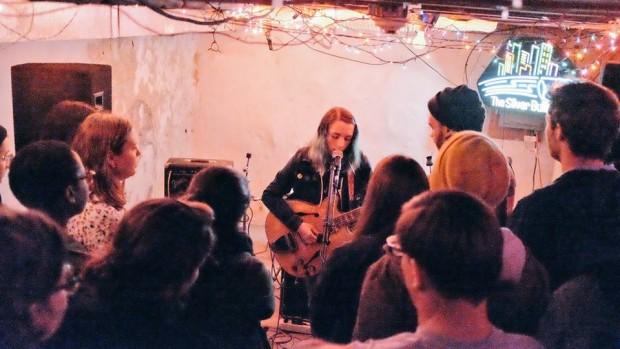
Harmony Woods | photo by John Vettese for WXPN
Whether the band is playing live or the record is playing on speakers, Harmony Woods has a near-universal effect on its listeners. People stop what they’re doing. They pay attention. And they want to hear it again as soon as possible.
Grinberg sums up the appeal in one word: “Vulnerability. I think it makes people realize that we all feel this way, no matter how hard of an exterior we have. You can be this boss man, you know? Like ‘ugggh, I’m not gonna…this isn’t…whatever…’ And when you listen to her music, it’s hard to deny. You can’t! It’s beautiful, it’s soft. And we really need that kind of music, we need to feel that way sometimes, we need to feel connected to that softness in ourselves.”
“I’ve been lucky enough to see Sofia transition into an artist that can write a full-length, rather than just a well-paced demo,” adds Cassar. “Most songwriters with longer careers haven’t quite unlocked that art as succinctly and robustly as she has. It’s a really cohesive narrative intensified by the honest, vulnerable way it’s told. And as a writer and hopeless romantic sap myself, I couldn’t help but relate.”
For Verbilla, the future is looking bright. As Grinberg notes, she’s already begun being recognized (or “rockignized,” they joke, womp womp) at gigs – it’s been hard not to spot her this past year, with her hair dyed either cool aquamarine or radiant fuschia. “We joke around that people call her Hamony,” Grinberg says. “Like Hannah Montana. It’s your alter ego, Harmony Woods.”
Even though it’s only a few short weeks till she’s done, Verbilla is about ready for high school to be behind her. (When we talked, she was frustrated that graduation falls on the same night that Sorority Noise plays Union Transfer.) On Tuesday, May 16th, she headlines a Nothing Special album release party at JJ’s Diner, the new name for the house that was once Michael Jordan. It’ll be a full circle moment for her, and this summer, Harmony Woods heads out on a short tour in support of the album, with a Philly gig at Everybody Hits; in the fall, she’ll enroll in Drexel University’s music industry program. And she’s writing.
“Hopefully, sometime after tour, the songs will be done and the record will be written in my head,” she says. “And hopefully we can demo them out full band and make a new record.”
We can’t wait for the next chapter to arrive.
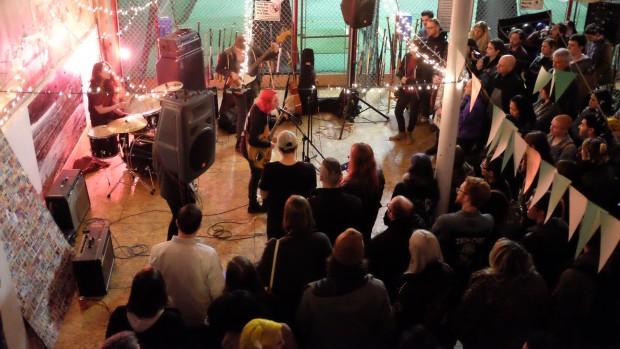
Harmony Woods | photo by John Vettese for WXPN
Harmony Woods celebrates the release of Nothing Special on Tuesday, May 16th at JJ’s Diner with Soft Idiot and Major Pursuit; more information on the all ages gig can be found at Facebook.